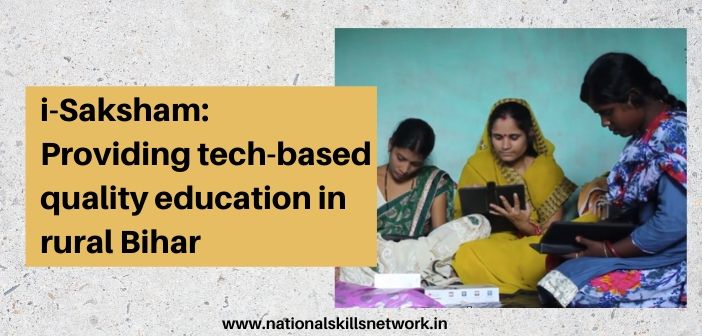India was already grappling with a resource-constrained rural education system when the March 2020 lockdown began, shutting down regular schools and any after-school educational programs. However, for Bihar-based, i-Saksham, a lockdown meant a change in the medium of education, not a pause in education.
Founded in 2015 by Ravi Dhanuka, Aditya Tyagi, and Shravan Kumar Jha – three ex-Prime Minister’s Rural Development Fellows – i-Saksham is an NGO that tackles the educational crisis in conflict-hit Jamui and Munger districts of Bihar by providing quality learning through community engagement.
They train local community educators to become edu-leaders through a two-year fellowship program. During the course of their fellowship, these edu-leaders provide supplementary education in nearby government primary schools as a volunteer to enrich the educational experiences of children and work with the community to enhance their participation and ownership.
 Today, despite the unrest and constraints, they have brilliantly adapted their educational model to continue helping children learn during the crisis. They quickly conducted a telephonic survey with 500 parents to access the on-ground situation; how the community was coping and the learning status of the children. They learned that 50% of the children had access to a smartphone.
Today, despite the unrest and constraints, they have brilliantly adapted their educational model to continue helping children learn during the crisis. They quickly conducted a telephonic survey with 500 parents to access the on-ground situation; how the community was coping and the learning status of the children. They learned that 50% of the children had access to a smartphone.
Ensuring self-reliance in times of COVID-19
Ravi modified the i-Saksham programs to ensure that the biggest stakeholders- youth edu-leaders, students, and caregivers can continue their quest for quality education in spite of physical distancing.
Once the lockdown was announced, they started virtually training over 20 edu-leaders on how to conduct e-learning sessions with their students over conference calls. The team also curated digital content with engaging lesson plans and collaborated with parents and other family members (who had smartphones) to provide on-site learning support to the students. Today, more than 20 i-Saksham edu-leaders are teaching over 350 students over the phone.
Dynamic solutions from edu-leaders
The edu-leaders are leveraging their leadership and problem-solving skills to make the best out of the lockdown situation. For the pragmatic Anshu, her father’s grocery store served as the perfect centre to distribute worksheets to her students. When her students’ parents came by to replenish their food stocks, they also walked away with a worksheet that helps their child!
Praveen, an i-Saksham Fellow, continues to do what he does best – teach Mathematics. For 2 hours every day, he teaches Mathematical concepts and guides his students through practice exercises over a phone call or video calls.
Related Article: i-Saksham develops Community Educators through Innovative Education Programs – Read More: https://nationalskillsnetwork.in/i-saksham-develops-community-educators/
Sonam, another edu-leader is weaving online storytelling with learning. She narrates a compelling story over the phone to her students, and then sets them fun writing and drawing-based homework to ensure learning!
Developing a new-age sustainable solution
Ravi does not see i-Saksham’s new model as a stop-gap solution to the physical-distancing problem. In fact, he believes that it is an opportunity to innovate and enable educational systems to use basic technology and community engagement to reach out to kids and provide quality content. He wants to build a network of excellent facilitators to educate the children and encourage self-learning.
He asserts, “Physical distancing will be there for a long time. Community leaders cannot go out to teach. We need modalities such as parental engagement that can integrate into the day-to-day learning of the child.”
Team i-Saksham is in the process of recruiting more edu-leaders from SHGs in neighbouring districts.
Guest Author – Naomi Menezes, Communications Associate, UnLtd India
E-mail ID – naomi.menezes@unltdindia.org












